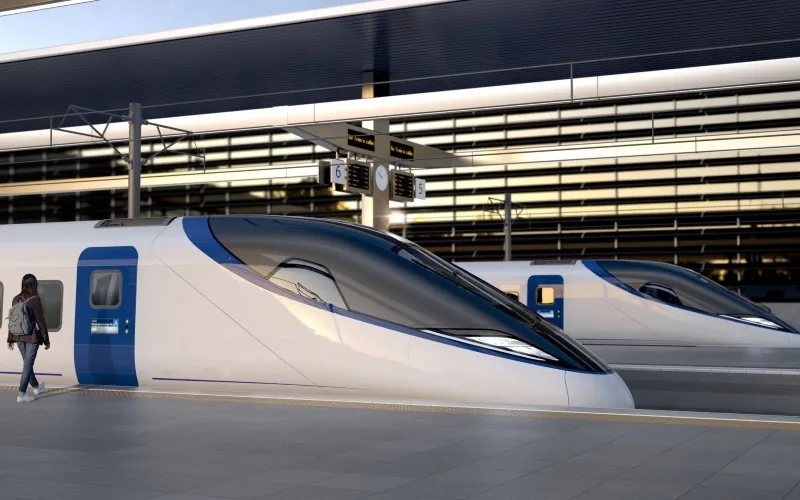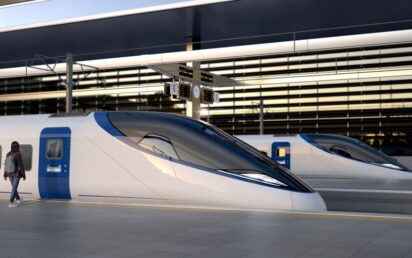Forty Greater Manchester businesses have written to the Prime Minister in protest at his decision to scrap the Birmingham-to-Manchester leg of HS2.
Rishi Sunak used the Conservative Party Conference at Manchester Central to reveal that once the high-speed trains pass Birmingham, they will switch to using the existing West Coast Mainline track.
Rolling back the ‘levelling up’ project would free up funds for the Northern Powerhouse Rail project – focused on rail improvements between Leeds and Manchester – as well as a £5 billion plan to upgrade the Midlands rail network between Nottingham, Coventry, Birmingham and Hereford.
Around £2.2bn has been spent on the Birmingham-to-Manchester leg so far. Parliament has granted compulsory purchase powers between the Midlands city and Crewe, but not yet for the 28 miles between Crewe and Manchester.
The business leaders called on the government to commit to building HS2 in full, describing the project as “fundamental to the economic future of the whole of the country”.
“In deciding on the future of HS2 you hold the future prosperity of the North and Midlands in your hands,” they told the PM on Tuesday night. As businesses with a deep interest in the long-term future of Manchester and the UK as a whole we urge you not to cancel HS2.
“It would be a major act of economic self-sabotage and damage our international standing as a place to do business. We recognise the challenge of controlling costs, and like others from business organisations across the country stand ready to work with you to address this issue.
“But we also firmly believe that this should not prevent us from making investments that are fundamental to the economic future of the whole of the country for future generations. This should not be seen as a choice between improved North-South connections and improved East-West connections.
“HS2 should not be seen as a standalone infrastructure project. It will unlock prosperity and growth across the cities in the North and Midlands. We know that this is what infrastructure investment does – it provides the scaffolding on which businesses invest, create jobs and generate opportunities for our communities.
“The strategic case for HS2 has always been centred on the opportunity for economic growth, regeneration and development beyond the impact of direct expenditure.
“Creating additional capacity on the major rail arteries in and out of London is essential if we are to keep the economy moving. Connections to London as a major global capital is essential for many of our businesses and for London the ability to access markets in the North and Midlands is just as important.
“Despite the blip of the pandemic demand for travel continues to grow. We know there is no room for more rail freight and within a few years there will be no more passenger capacity with more delays, higher costs and less reliability becoming inevitable consequences of lack of investment. This will damage investor confidence and the prospects of the towns and cities of the North and Midlands.
“This is not all about cities, or even the UK economy as a whole. You have said that you want to see better opportunities and investment in towns. We are clear that creating greater capacity on the rail network will help these towns – freeing up commuter routes and creating more jobs, wealth and reasons for young people to stay and help build the northern economy.
“We have been overwhelmed to see not just the level of business support up and down the country for HS2 as part of a network of investment in our infrastructure but also the level of public support in the recent weeks.
“People know costs need to be controlled, and there is the need for tight scrutiny of the programme, but we also all recognise the need to build for the future success of our towns, cities and communities. This is a once in a lifetime opportunity which we cannot afford to throw away.
“Scrapping this scale of infrastructure investment would risk our standing as a globally competitive UK in the future, and adversely impact our communities for decades to come.”
Building a crisis comms strategy: proactivity wins over reactivity every time
The businesses range from property companies such as Bruntwood and OBi to giants KraftHeinz and Aecom, Manchester United Football Club, Manchester Airports Group (MAG), The University of Manchester, Gary Neville’s Relentless Group, electric vehicle companies, tech firms including musicMagpie and Kratos Analytical, as well as bodies including pro-manchester and the Greater Manchester Chamber of Commerce.
A reported late intervention from Chancellor Jeremy Hunt reversed a potential plan to end HS2 in the London suburb of Old Oak Common, rather than Euston Station in Central London.
Meanwhile former Prime Ministers Gordon Brown, David Cameron, Theresa May and Boris Johnson all slammed the decision to end high-speed rail in Birmingham, alongside West Midlands Mayor Andy Street and Greater Manchester Mayor Andy Burnham.
Conservative Street accused Sunak of “cancelling the future”, while Burnham said: “It will be a permanent statement for people in the North of England that they are second-class citizens when it comes to transport infrastructure.
“It beggars belief that they are going to pull the plug on that infrastructure that would pave the way for that new east-west line across the North, promised in not one, not two, but three Conservative manifestos.
“To pull that plug here in Manchester would show complete contempt to the city region and to the North of England as a whole.”
He added: “Do not pull the plug on this city while you are in this city. If you do those things, people here will never forget.”

